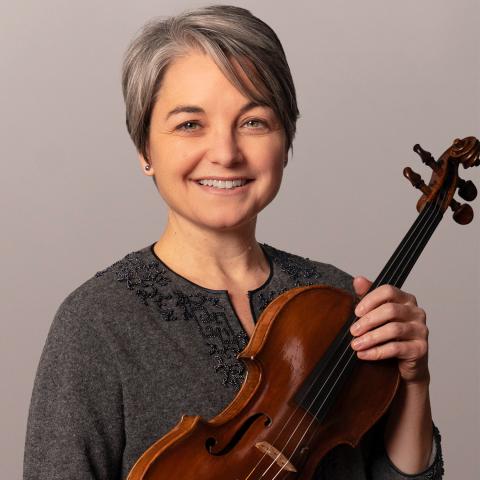Teacher Spotlight on Ashley Pensinger-Sok, violin

November 3rd, 2021
Teacher Spotlight on Ashley Pensinger-Sok, Suzuki violin
Interview by Erin Cano, violin
Ashley joined MIC in the spring of 2021 as a Suzuki violin teacher
What led you to become a Suzuki teacher?
I was a Suzuki student. I started taking violin lessons at age 5 and went to the American Suzuki Institute in Stevens Point, WI for 8 summers with my mom. Being a Suzuki student was a big and positive part of my childhood. But years later, after I had decided to be a violinist and violin teacher, I wasn't sure I wanted to be a Suzuki teacher. I had started teaching a few students while in graduate school and I was quite overwhelmed by the freedom I had - there was so much to teach, and so many books I could use, so many ideas I could share. My mother encouraged me to take the first level of Suzuki teacher training and I skeptically went back to Stevens Point as a teacher trainee. I was amazed at how detailed the training was. It was fascinating to observe the classes and lessons, and I was so impressed by the generous attitudes and encouragement of all the teachers. It was also very moving for me to see the Suzuki experience from the perspective of a teacher. I was hooked!
Which of your teachers inspired you the most? What aspects of their teaching have you integrated into your own style?
One of my teachers who influenced me the most is Catherine Van Hoesen, of the San Francisco Symphony. She was brutally honest. She would listen to me and say, “You do this,” and then show me what I was doing. My first reaction (in my head) was - No, I don't do that! But she was right and it was shocking and humbling. She was also funny and genuinely believed I could do better. She explained why the way I was doing things wasn't giving me the results I wanted. She really helped me to wake up and hear and see myself more clearly. She also helped me examine how I was practicing and took the time to go into the details of how I should practice.
I think practicing is hard. It took me many, many years to be a “good practicer”, and I think it is a life-long pursuit. I believe in taking the time, with my students, to explain how to structure their practice and how to practice a difficult spot. I want to get a sense of what is working for them and how things are really going at home. This is a huge subject and a difficult challenge as a music teacher, but I strive to help students and their parents in this often confusing process.
What is your favorite Suzuki piece to teach?
One of my favorite pieces to teach is O Come Little Children. It is a big piece with a lot of challenges. There are many steps involved in learning this piece - the bowing pattern, the bow direction, the string crossings and then coordinating the melody in the left hand with all of the complicated things the bow is doing. This piece can feel like a big mountain to climb, but I love to work on it layer by layer. Eventually, when a student can play it, it feels like such a big accomplishment! As time goes on, when they have really mastered it, it is a piece that really sings.
You’re the parent of two Suzuki children. What insights have you developed as both a Suzuki parent and teacher?
For me, being a Suzuki parent is humbling, wonderful, extremely challenging, and thrilling (and many things in between!). One insight is: the commitment and the time it takes to keep the train going every day is more than I imagined before I had kids. Even I, as someone who is really committed to this way of life, struggle with it and sometimes it feels really heavy and lonely. This helps me to have compassion and understanding for other parents and all that they are juggling to keep the practicing going. With consistent work, our kids are making incredible progress but it is hard to see it on a day-to-day basis.
Another insight is: a little creativity makes practicing easier! Things usually go a lot better if I can take a few minutes before practice to think about the plan and find a little way to be creative. The thing that worked in the lesson doesn't work the same way at home and the thing that worked yesterday may not work today. Making simple games, giving the student choices, varying the routine, and finding ways to move around the house are just some of the ideas that can lighten the mood and help us see the work with a fresh perspective. Suzuki study, over the long-term, has brought so much beauty, strength, so many opportunities and many wonderful people into my life. I truly believe it is worth it.

